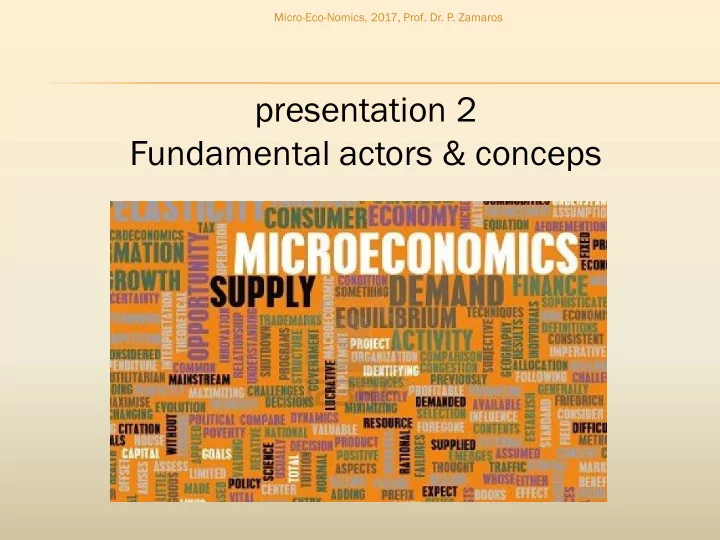

Micro-Eco-Nomics, 2017, Prof. Dr. P. Zamaros presentation 2 Fundamental actors & conceps
Micro-Eco-Nomics, 2017, Prof. Dr. P. Zamaros Fundamental actors Individuals Business organizations
Micro-Eco-Nomics, 2017, Prof. Dr. P. Zamaros Individua uals If individuals are biologically autonomous , they are psychologically and socially transduced (i.e. when something foreign enters an organism). This mutual participation involves two flows or transference relations: • Self to other • Other to self The relationship is also characterized by transformation where self and other influence one another.
Micro-Eco-Nomics, 2017, Prof. Dr. P. Zamaros Busines ess s Organ ganiza zation ons a/The being of business organizations Business organizations systems are set by law to carry out a business purpose. This means that without the legal conditions and framework they cannot fulfill their purpose. b/Main features If business organizations are legally set to be autonomous in the sense of deciding for themselves, the fact that they depend on resources to exist, they are socially transduced.
Micro-Eco-Nomics, 2017, Prof. Dr. P. Zamaros Thus the relations an organization has with its stakeholders (internal & external) are relationships of • Transference – information flows • Transformation – adapting policies and strategies c/Types of transference Relative to the power of transformation they involve: Inbound flow 1: the domestic environment has an impact on the business organization in terms of the production resources available (L, K), state policies, market structure, and stakeholder desires
Micro-Eco-Nomics, 2017, Prof. Dr. P. Zamaros Inbound flow 2: the foreign environment as an impact on the business organization in terms of the production resources (L, K) the firm needs, foreign state policies, foreign market structures Outbound flow 1: the organization influences the domestic environment in terms of the products and services it provides, competitive strategies, and advertising impact
Micro-Eco-Nomics, 2017, Prof. Dr. P. Zamaros Outbound flow 2: the organization influences the foreign environment with its products (exports), competitive strategies, and advertising Non-bound flows: neither the environment (domestic, foreign) impacts on the business organization owing to the size of the firm, nor the business organization on the environments owing to its non-competitive stance.
Micro-Eco-Nomics, 2017, Prof. Dr. P. Zamaros Fundamental concepts Trust Language
Micro-Eco-Nomics, 2017, Prof. Dr. P. Zamaros Trus ust A fundamental value in all relationships is trust The following views: • Interpersonal – trustworthiness • Functional – stakeholder faith • Existential – making possible beyond what there is
Micro-Eco-Nomics, 2017, Prof. Dr. P. Zamaros Langua guage “If trust is about making possible, what enables this possibility is language” a/The “being” of language Language is a descriptive system made up of: • Signifiers making up the discursive signature • Signifieds making up the discursive meaning
Micro-Eco-Nomics, 2017, Prof. Dr. P. Zamaros b/Language construction A discourse as specified and specific language, is the result of choices: • Signifiers are chosen as per the choice of meaning • Signifieds are chosen as per the purpose that language must fulfil – ultimately to persuade
Micro-Eco-Nomics, 2017, Prof. Dr. P. Zamaros c/Effect of language construction The chosen signifiers and signifieds bring about coherence, a myth-ology, premised on 3 features making up the power base of the myth-ology: • Clout – familiarity and security • Credibility – replication of values • Constancy – durability and test for time
Micro-Eco-Nomics, 2017, Prof. Dr. P. Zamaros d/The power base in use The power base of a myth-ology recruits or summons. Typical summoning strategies include • Doctrinal summoning – e.g. political discourses • Archetypical summoning – e.g. marketing discourses
Recommend
More recommend